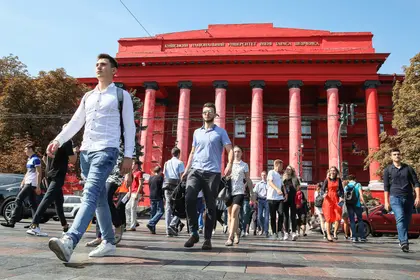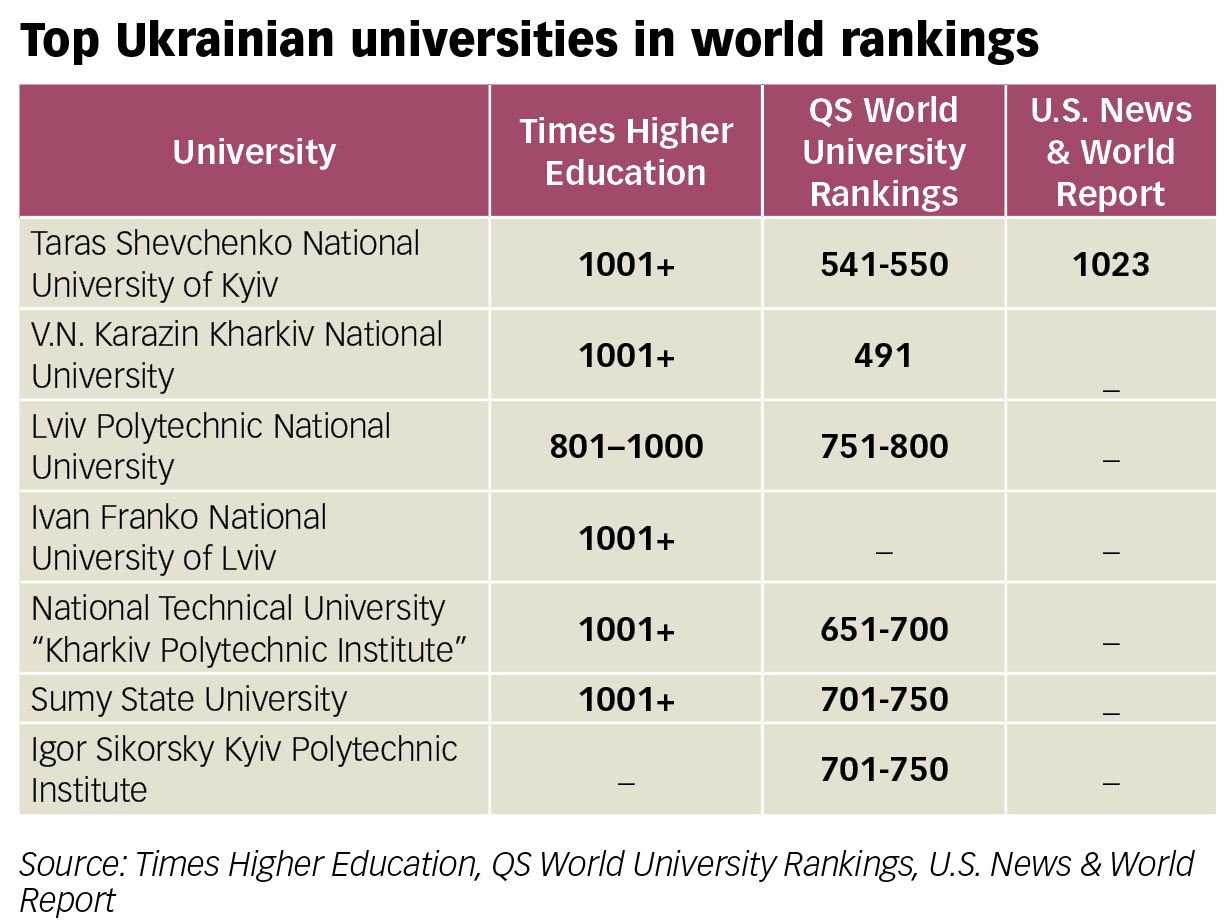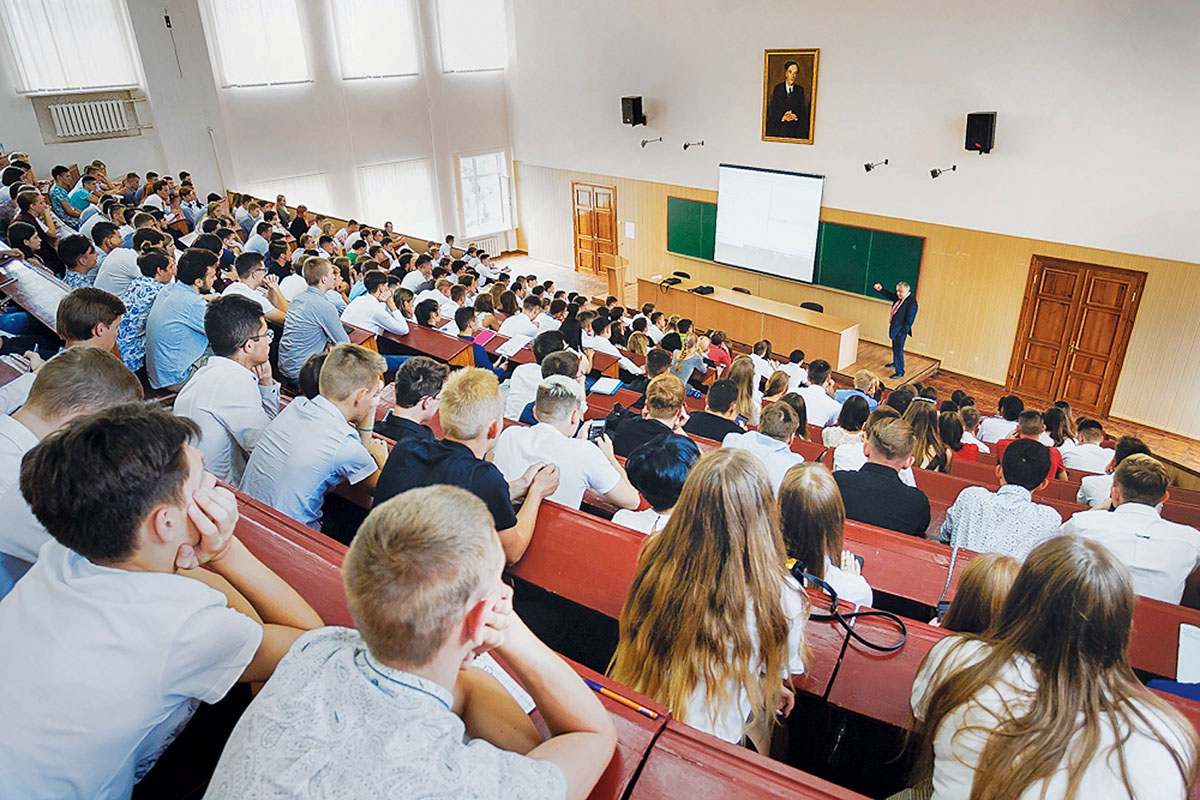What Ukraine considers to be its best universities are actually some of the world’s worst, according to rankings that purport to measure world higher education quality.
Some of Ukraine’s most prestigious institutions — sites of intense competition for admission every year — appear to have a number of issues, which might point to bigger problems with which the whole Ukrainian education system struggles.
JOIN US ON TELEGRAM
Follow our coverage of the war on the @Kyivpost_official.
“The system is weak and it needs to be changed,” says Serhiy Kvit, Ukraine’s former minister of education and science and the current head of the National Agency for Higher Education Quality Assurance.
According to the latest ranking by U.K. magazine Times Higher Education, published on Sept. 12, six Ukrainian universities made it onto the list of the top 1,400 schools in the world.
However, all of them failed to receive the individual rankings that more elite schools get, and they broadly lagged behind the frontrunners.
The rating — which measures teaching, research, knowledge transfer and the university’s international outlook — ranked Lviv Polytechnic National University the highest among Ukrainian schools, in the 801–1000 grouping.
Meanwhile, such giants as Taras Shevchenko National University of Kyiv, V. N. Karazin Kharkiv National University — which are often deemed the best schools in domestic ratings — and three more are in the worst group: 1,001 and below.
Another recently-published ranking, the Quacquarelli Symonds or QS World University Rankings, rated the two giants higher, in between the 491 and 550 positions.
However, its criteria differ from those of the Times Higher Education. Quacquarelli Symonds is based on six performance indicators such as academic reputation, employer reputation, student-to-faculty ratio, research citations per faculty, international staff and student ratio.
As for the U. S. News & World Report, only one Ukrainian university, Taras Shevchenko, made it into its latest ranking. The report focuses specifically on schools’ academic research and reputation overall, and it ranked the Taras Shevchenko institution at only 1,023 out of 1,249.
Volodymyr Bugrov, vice-rector of Taras Shevchenko University, says such low rankings can be seen as indicators of all the problems Ukraine’s education system is dealing with.
“A rating is a tool for making conclusions,” Bugrov says.
Little research
Inna Sovsun, a lawmaker and an expert in education, says that the reason for such ranking results is the low quality of most Ukrainian universities.
“Unfortunately, Ukrainian universities are not developing properly to ensure that they are ranked high,” Sovsun told the Kyiv Post.
Scientific work and research are some of the key criteria for most rankings. But according to Sovsun, the small amount of research and scientific work carried out by students is one of the biggest problems in Ukraine’s higher education system.
The amount of scientific research is measured by the number of publications in recognized scientific journals. According to Anton Panteleimonov, the vice president for research and education at Karazin Kharkiv National University, their students published over 600 scientific works in 2018.
Even though the Karazin and Taras Shevchenko universities conduct a solid amount of scientific research, it is still not enough to compete with the world’s best universities, Sovsun says.
“We still have this concept left over from the Soviet Union times, when our universities aimed to teach students, but not to urge them to conduct scientific research,” Kvit says.
Additionally, many higher education institutions still can’t afford the new equipment that their students need to do proper research.
“There is no way Ukraine can expect good results in science when the country’s universities still use equipment that is 20–30 years old,” Sovsun says.
Funding
One of the main reasons for so little research is that the state doesn’t provide Ukrainian universities with enough funds to spend on research.
“We need to change the whole economy of Ukraine’s higher education,” Kvit says.
The experts believe that the current policy of state financing damages the quality of Ukrainian higher education. First of all, there is not enough funding.
In 2018, the budget for education was about Hr 210 billion ($8.4 billion). And about 21% of it was spent on higher education. This year, the government plans to allocate Hr 245 billion ($9.8 billion) overall for education. That is about 6% of Ukraine’s gross domestic product (GDP).
According to Kvit, Germany spends about the same percentage of GDP on education. However, their GDP exceeds Ukraine’s by 34 times.
Sovsun says this money might have been enough if only it were distributed wisely, which doesn’t appear to be the case.
Ukraine has over 200 universities that all receive financial aid from the state. According to Sovsun, that’s way too much for a country with a population of 42 million. In the United Kingdom, for instance, the 67 million citizens have half as many universities than Ukraine, or about 100. Apart from that, Ukraine gives scholarships to about half of all its students, or over 600,000 people yearly.
“We divide the state budget between a great number of institutions,” says Sovsun.
This affects salaries, as well as universities’ budgets for research and international activities. The experts says that the state should be more selective when it picks institutions to fund.
“There are universities that do almost no scientific research but still get the same budgetary funds as those that do,” Sovsun says.
According to her, there is a need to focus on financially supporting those universities that can guarantee the quality of their work and have potential for scientific work. The authorities need to make sure that state investments bring results, she says.
Regular investment in those universities that do scientific research can also help Ukraine take higher spots in the world rankings, experts say. And the institutions will aim to do a better job with research if their funding depends on it, they add.
“Universities should be responsible for the quality of research and the quality of their graduates’ knowledge,” Kvit says.
Positive promise
Yuriy Rashkevych, deputy minister of education and science, says that Ukrainian universities’ places in world rankings are not one of the goals that the ministry is pursuing.
“It should be a side positive effect in improving the quality of higher education and science,” Rashkevych says.
However, the ministry is taking action in order to distribute its expenses more effectively. They are currently conducting a scientific certification of universities in order to distribute budgetary funds according to the scientific results the schools have.
Apart from that, Rashkevych says the ministry also wants to increase the budget for education for the upcoming year. However, experts say that global rankings are an important indicator of the quality of higher education.
“Every country wants to have some universities that would be included in these global rankings,” Kvit says.
You can also highlight the text and press Ctrl + Enter






